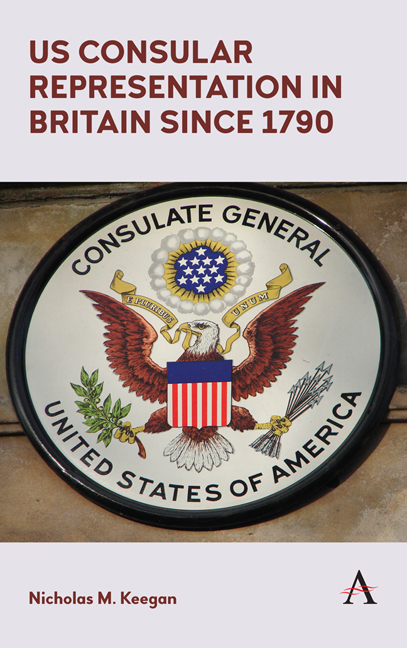Book contents
- Frontmatter
- Dedication
- Contents
- List of Illustrations
- Foreword
- Preface
- Acknowledgements
- Introduction
- PART 1
- PART 2
- Chapter Four US Consular Representation in Britain
- Chapter Five Impact of the Civil War and the Role of American Consuls in Britain
- PART 3
- Appendix: Locations and Categories of Consular Offices
- Notes
- Sources
- Bibliography
- Index
Chapter Five - Impact of the Civil War and the Role of American Consuls in Britain
from PART 2
Published online by Cambridge University Press: 21 June 2018
- Frontmatter
- Dedication
- Contents
- List of Illustrations
- Foreword
- Preface
- Acknowledgements
- Introduction
- PART 1
- PART 2
- Chapter Four US Consular Representation in Britain
- Chapter Five Impact of the Civil War and the Role of American Consuls in Britain
- PART 3
- Appendix: Locations and Categories of Consular Offices
- Notes
- Sources
- Bibliography
- Index
Summary
Independence did not prove to be the panacea that would cure the new American nation's ills. There were further major military battles to be fought. This time however they were not against a foreign power, but against fellow countrymen. The abolition of slavery had long been a vexatious topic: in broad terms, the southern states, and in particular their cotton plantation owners, favoured the retention of slavery whereas the northern states did not. Confederate President Jefferson Davis said that the ‘northern majority was tyrannous because it actively opposed slavery, and so secession was practically justified as well as constitutionally proper’. US President Abraham Lincoln, on the other hand, maintained that ‘One-eighth of the whole population were colored slaves, not distributed generally over the Union, but localized in the southern part of it. These slaves constituted a peculiar and powerful interest. All knew that this interest was somehow the cause of the war.’ With such diametrically opposed stances there was no room for compromise. The southern states therefore decided to secede from the Union.
The ensuing Civil War pitted Americans against each other. The Union, or North, fought to prevent the break- up of the United States of America, while the Confederacy, or South, fought to establish a separate Confederate States of America. The first shots were fired in April 1861 when Confederate troops bombarded Fort Sumter, a US military post situated on an island within the harbour of Charleston, South Carolina. The engagement lasted only about 36 hours; there were no casualties and a surrender was quickly negotiated. Although the war began without casualties, by its end the losses were enormous. Estimates of the number who died range between 530,000 and 620,000, greater than the total number of Americans killed in both world wars. To put this into a more modern perspective, 620,000 dead represented 2 per cent of the American population; in 2002, 2 percent would have been five million.
Action was not confined to American soil, however, and Britain, the old enemy, found itself caught up in events. All southern US ports were blockaded by the US Navy and this had an unexpected and unintended consequence.
- Type
- Chapter
- Information
- US Consular Representation in Britain since 1790 , pp. 73 - 90Publisher: Anthem PressPrint publication year: 2018



